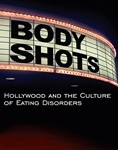Meet the Author: Dr. Emily Fox-Kales!
On Wednesday, November 16, 2011 at 12PM in 90 Snell, Northeastern University Libraries will hold another one of its unique and enlightening Meet the Author events. Come hear author and Northeastern professor, Dr. Emily Fox-Kales, talk about her latest book, Body Shots.
Body Shots exposes the scandalous yet disturbing standards centered around Hollywood and the repeating message that thin is beautiful. In her research, Dr. Fox-Kales explores how Hollywood uses films, celebrities, and social media in order to propagate obsessive weight control, self-scrutiny and vigilance, and excessive exercise. By utilizing her studies of psychology, cinema analysis, and gender studies, Dr. Fox-Kales analyzes these Hollywood values and how it unfortunately has become the norm in today’s society to obsess over weight and eating habits.
During the Meet the Author event, Dr. Fox-Kales will discuss her new novel in further detail and also sign books following the talk. Books will be available for purchase at a discounted rate and provided by the NU Bookstore. This event is free and open to the public. Refreshments will be served.
For more information about our Meet the Author series and other related programs, click here!
